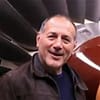Date of Birth: 12 January 1963
Nationaliy: British
Current Appointment: Principle Research Fellow (RAIV) and head of Aeroelasticity Group in the Vibration University Technology Centre, Department of Mechanical Engineering – Imperial College
Higher education
1981-1984 Studied Applied Mathematics at the University College of Wales – Swansea -Obtained BSc with first class honours
1984-1985 Attended the Finite Element MSc course at the Department of Civil Engineering at University College of Swansea. Awarded MSc with Distinction
1984-1988 Studied for PhD at the Department of Civil Engineering at University College of Swansea under the supervision of Prof. Ken Morgan. Title of PhD : ‘High resolution methods for unstructured grids’. Awarded the PhD degree of the University of Wales
Appointments
Oct 1988 – 1989 Research Assistant, CFD Group, Department of Civil Engineering,University College Swansea
Oct 1989 – 1992 Research Associate, Department of Aeronautics, Imperial College
1992 - 1996 Research Associate, Department of Mechanical Engineering, Imperial College
1996 - 2002 Research Fellow (RAII), Department of Mechanical Engineering, Imperial College
2002 - 2017 Senior Research Fellow (RAIII), Department of Mechanical Engineering,Imperial College
2017 - Date Principle Research Fellow (RAIV), Department of Mechanical Engineering,Imperial College
2001 Awarded by Rolls-Royce plc the title Rolls-Royce Research Fellow in Imperial College – First person to receive this award. Only 4 titles have been awarded by Rolls-Royce. I received this title as recognition of my contributions to the company
Professor Vahdati is the Principal Research Fellow in the Dynamics Group, and leads the Aeroelasticity Group in the Vibration University Technology Centre sponsored by Rolls-Royce plc.
His main research focus is the development of CFD algorithms, modelling fan blade flutter, turbine and compressor forced response, stall and surge modelling, and aeroacoustic and aeroelastic phenomena. In practice,one of the main reasons for turbomachinery failure is vibration, and our work is directly relevant to industry.
Through modelling the behaviour and mitigating causes of engine failures, leads to substantial increases in safety and reliability, provides energy-efficient environmental friendly benefits and major costs savings.
Research Activities
• Development of CFD algorithms for the efficient numerical modelling of both internal and external flows.
• Fan and compressor blade flutter.
• Compressor forced response
• Simulation of one-off events, such as bird strike, blocked compressor vane.
• Stall and surge modelling in compressors.
• Prediction of aero-engine noise
• Development of low order models for use during design stage• Aeroelastic behaviour of wind turbines.
Keynote Conference presentations
• ‘Aeroelastic vibrations in aero-engines’, Aeroelastic issues in Gas turbines, GTRE Bangalore, 19th-22nd July 2016
• ‘A mechanism of aeroelastic instability in transonic fans Keynote paper -13th International Symposium on Unsteady Aerodynamics’, Aeroacoustics and Aeroelasticity of Turbomachines,Tokyo, Japan September 2012
• ‘Study of Turbomachinery Aeroelasticity using an integrated 3D non-linear method’, von Karman Institute for Fluid Dynamics, May 1999.
• An overview of computational Turbomachinery aeroelasticity Keynote paper - 11th Int Symposium on Unsteady Aerodynamics, Aeroacoustics & Aeroelasticity of Turbomachines, Moscow, Sept 2006
Publications
• I am the author of 50 peer reviewed journal Publications and 65 refereed conference proceeding papers and have contributed chapters to 6 books. I have won best paper awards at European Turbomachinery Conference and ASME turbo Expo. My Google Scholar H-index is 19 and I10-index is 34.The Google citations to my articles are shown below.